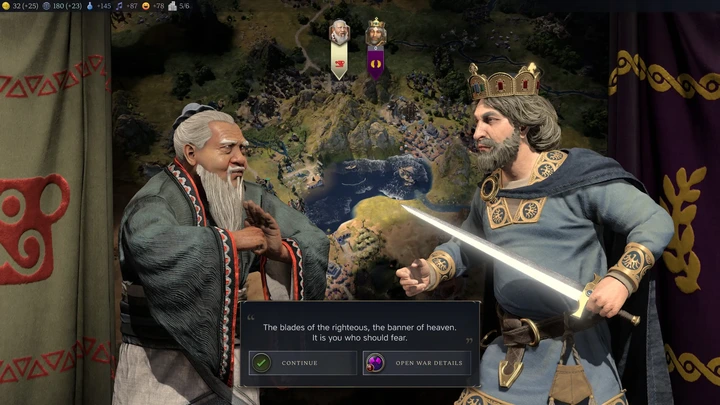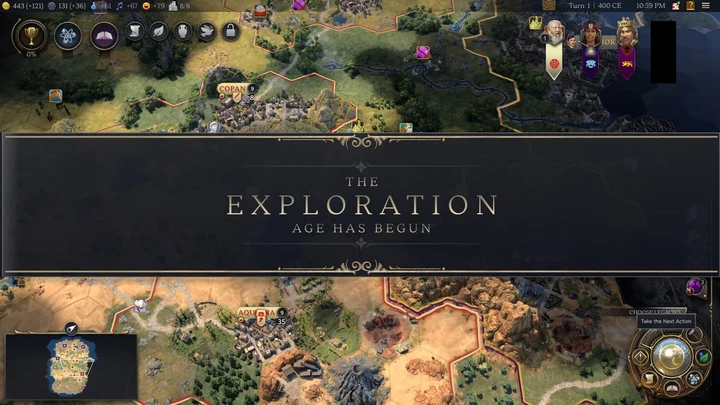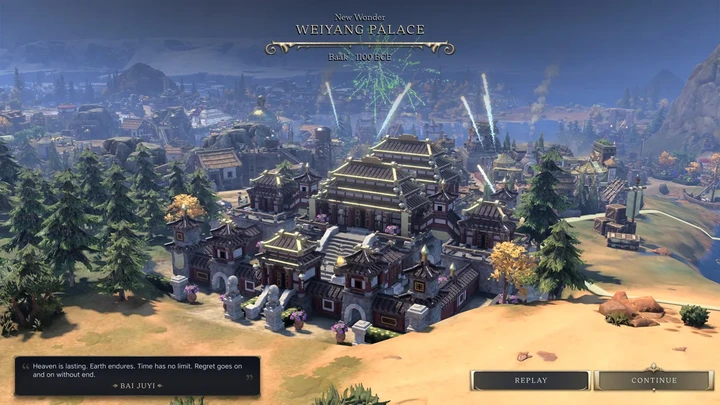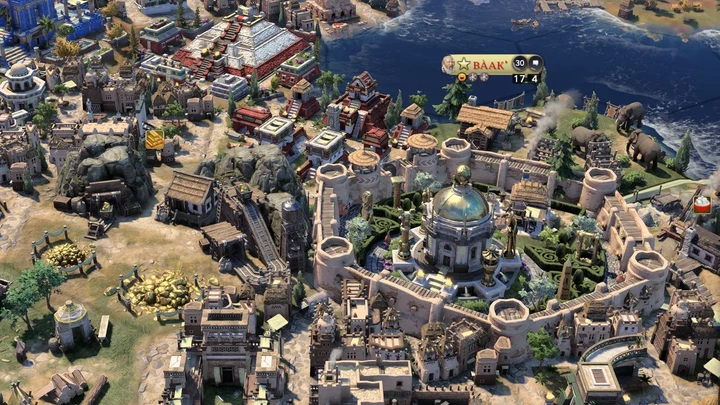Stepping into a new era feels like a gentle reboot of the game, potentially providing the refresh the series has been longing for.

View pictures in App save up to 80% data.
It's judgement day for Charlemagne of the Roman Empire (not 'Holy' Roman Empire, I hasten to add, as leaders are no longer attached to their historical civilisations in Civilization 7). I'm playing the grand strategy game for PC Gamer's forthcoming review—it's out February 11—and after several millennia of strained diplomacy with Charlemagne, throughout which I'd graciously accept his Open Borders proposals while he'd dismiss my own and slowly grow to dislike me due to our agendas not aligning, I march on his empire, his capital still hidden somewhere beneath the cold stone hexes that make up the fog of war.
The conflict that unfolds carries an intense sense of apocalyptic finality. We are witnessing the twilight of the Age of Antiquity. The progress made during this period, a culmination of the cultural, economic, military, and scientific triumphs of all the civilizations within the game, is nearing its conclusion. The construction of magnificent wonders and other significant milestones has given way to a devastating plague sweeping across the continent—one of several 'Crisis' scenarios that emerge as an era draws to a close—and a war that has ensnared every civilization and city-state across the land (clearly, I wasn't the only one fed up with Charlemagne's Byzantine antics).
The sense of impending doom is intensified by my complete uncertainty about what the world will resemble following the shift from Antiquity to the Age of Exploration. The game has been cautioning me to get ready, yet nothing could truly equip me for what might be the most revolutionary and disruptive feature ever introduced in this series.
My Mayan forces are rampaging through the Roman Empire, spearheaded by Commanders who introduce innovative tactical elements to the combat system. Expanding on the Great General units from earlier installments, these Commanders provide enhancements to nearby units while also serving as carriers, allowing you to group multiple units onto them and navigate the map using a single tile. When the time for battle arrives, you can disperse your armies around the Commander, who can issue special commands like 'Focus Fire' to amplify your offensive capabilities. Unlike previous versions, individual units no longer accumulate experience points during combat; instead, all combat XP is directed to the nearby Commander, which can be invested in skill trees that enhance their abilities both in warfare and in times of peace (for example, by increasing resource yields when they are stationed in a city).
Soon enough, Charlemagne's stronghold comes into view. With the Age of Antiquity nearly wrapped up at 98%, I am resolute in my goal to mark this period with the conquest of Rome (though I can't help but feel let down by the lackluster opposition, raising suspicions about whether Firaxis has addressed the previous game's infamous AI shortcomings). My cavalry ravage the outskirts of the city, eliminating the oddly vulnerable Roman leaders, while my ballistae unleash destruction upon the heart of the city. Ultimately, my trusty Jaguar Slayers make their way into the almost unguarded capital.
Thus, the Age of Antiquity draws to a close.
A courageous new era

View pictures in App save up to 80% data.
At this point, things start to get a bit wild, especially for those who know the typical progression of a Civ game. With just one turn remaining to get ready for the upcoming age, I decided to link my best units to commanders, believing this would ensure their continuation into the new era. However, as it turned out, all my military units were wiped out regardless, which was surprising since the Civopedia implied a different outcome. To get to the bottom of this, I've reached out to Firaxis for clarification on the situation.
When the age transition finally arrives, it feels as if one game concludes and another one is set to start. The victorious theme music plays, and you have the chance to review the legacy points you've gathered along with the rankings from the previous age. After that, you choose a new civilization to guide into the upcoming era. Since my Mayan civilization heavily relied on rivers, I qualified to unlock the Songhai for the Exploration era, which provides advantages for river tiles and various economic trade benefits.
I certainly experienced a sense of nostalgia for my Mayan civilization, where I had achieved so much, but its victories and achievements continue into this new age. Your lands remain secure, your leaders endure and hold onto their ranks, and the essence of your former civilization persists through distinctive districts, Wonders, and traditions that can be employed as social policies. Additionally, there are Legacy Points, which you accumulate by reaching various milestones across the four legacy avenues: Economic, Cultural, Science, and Military. Personally, I focused entirely on science during the antiquity period, which allowed me to access advanced scientific legacy options like Golden Age Libraries and the ability to transform all my accumulated Great Works from the Antiquity era—set to vanish with the era shift—into Science currency.

View pictures in App save up to 80% data.
However, a significant amount also evolves during the thousand-year gap that the game skips in the transition between ages. The city-states you once allied with have vanished, supplanted by new ones located in different areas on the map. Your units from the antiquity era, except for your commander, have been eliminated and replaced with a standard army consisting of six new-age units distributed across your empire. Additionally, all of your social policies, bonuses from antiquity-era building adjacencies, and codices have been erased. Perhaps the most notable shift is that all your cities outside of your capital revert to the status of towns, effectively turning them into resource producers—albeit highly efficient ones, based on experience—for your empire until you invest gold to upgrade them back into cities.
The centuries that unfolded during that era of transition were vividly mirrored in the moments I dedicated to examining my legacy and civilization options for the new age. After finalizing my choices, I stepped into an entirely transformed world, where adobe structures and minarets took the place of the wooden huts from the past. My loyal Jaguar Slayers, clad merely in loincloths, were now replaced by armored cavalry and the Gold Bangles Infantry, a unique unit from the Songhai civilization. Meanwhile, the soundtrack, as captivating and lively as ever, transitioned from the rhythmic chants of the Mayans and Buddhists to a more medieval Middle Eastern tone.
As many advantages from the previous era fade away, the disparity between the highest and lowest ranked civilizations diminishes significantly (though not to the extent that your prior accomplishments lose their value). The fresh opportunities and systems introduced in this new era pave the way for lagging civilizations to make a resurgence. Territories abandoned by fallen city-states evoke that thrilling early-game land acquisition sensation, while the advent of new maritime technologies allows all players to embark on voyages to explore new lands in a more synchronized manner, rather than with centuries of delay. Additionally, organized religion emerges, taking the place of the basic pantheons of the past.
Regardless of whether you find yourself on the winning or losing side, this new era presents an opportunity for a refreshing shift in focus. With my robust scientific background giving me a significant advantage as I step into this new phase, I've chosen to pivot towards religion, which largely influences the cultural legacy trajectory during the Exploration Age. In a game where the historical landscape is increasingly unpredictable—thanks to the ability to freely combine leaders and civilizations—I took solace in the fact that as Confucius, I established the Confucian faith. At last, there's a hint of structure amidst the chaos of this turbulent world!

View pictures in App save up to 80% data.
I'm still acclimatising to the impact of the Ages system, because the impact on the game is huge, though my early feelings on it are positive. While I can't see the hapless AI on default difficulty catching up to me in this campaign, in multiplayer this kind of rubberbanding can address the age-old Civ problem of those who get off to a bad start finding themselves in an unwinnable situation well before the halfway point of the game.
As a successful player in my game, I find that many of my accomplishments from the past continue to resonate in the present, providing a sense of fulfillment. My Wonders endure, the scientific advancements from ancient times will be remembered for generations, and my empire is still strong, though it could benefit from a revitalization with modern buildings and units. By introducing new technologies and systems tied to distinct eras, everyone has the opportunity to engage from a similar baseline—though some may have advantages at that starting line—while the periodic refresh of units prevents gameplay from becoming monotonous.
Even in the midst of my Civ 7 review, I can say that the question of whether this is the best iteration yet will probably be redundant until all the expansions roll out and we see the full vision enacted. What I can say is that its biggest, boldest shake-up to the series formula gave me a frisson of excitement at a point in the game where things might have started stagnating in previous iterations. That, already, is a major milestone passed on Civ 7's legacy path.